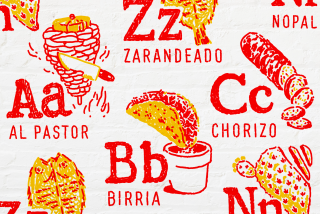The Irregulars proceed up and over to Gladwin Hill, descending to roast and barbecue a colleague, irregardless
- Share via
Because I think his Alliance Against the Vulgarization of English (AAVE) is a worthy cause, I am giving my friend and colleague Gladwin Hill a chance to rebut his critics.
As you may remember, Hill recently applauded Chief Justice William Rehnquist for rebuking a lawyer who used the word irregardless in court. There is no such word, Rehnquist advised the culprit, and Hill agreed.
He also said there is no such word as alright , and that barbeque is a misspelling evidently derived from the notion that the word has evolved from French. “If there was such a word in French,” he argued, “it would be pronounced barbeck .”
I have already reported that the Jack Smith Irregulars descended on Hill in full cry, pointing out that both irregardless and alright are in the dictionary, and that Hill’s was (in the phrase “if there was such a word in French,”) should be the subjunctive were . “Your critics of the AAVE merely underscore their own cognitive deficiencies,” says Hill in his rather testy defense.
He notes that the “ultimate authority on the English language, the Oxford English Dictionary, does not list irregardless .
“It does list alright , but only as an obsolete form from the Chaucerian era (AD 1175), when, as we all know, grotesque spellings were rife.”
He adds that H. W. Fowler, “the other ultimate authority,” dismisses alright in his Modern English Usage as follows:
“All right. The words should always be written separate; there are no such forms as all-right, allright or alright , even though the last, if seldom allowed by compositors to appear in print, is often seen through confusion with already and altogether in MS.”
Hill says: “The mere appearance of a word in a dictionary does not legitimize it; many words are listed simply to point out their erroneousness. Thus, the American College Dictionary mentions both alright and irregardless , but with the disclaimer ‘not generally regarded as in good usage.’ ”
I might add that American Heritage Dictionary notes that irregardless , “a double negative, is never acceptable except when the intent is clearly humorous.”
It hardly seems likely that the lawyer in Justice Rehnquist’s court was being humorous.
Hill also notes that “if . . . was” rather than “if . . . were” is supported by widespread usage.
I would go further. I would say that the use of were when was or had been is correct is the most common error made by otherwise careful writers. They write, in the past tense, “If he were hungry he would eat.” If in that case means when , or “on the condition that,” and was is correct. If his hunger is meant as a condition contrary to fact, the subjunctive had been is called for, and the sentence would read, “If he had been hungry, he would have eaten.”
Ruby Hoff Dickey of Sherman Oaks points out that Hill’s was is correct if his if means “on the condition that.” If his if means a condition contrary to fact, were is correct. In Hill’s phrase, either interpretation is possible, so Hill is vindicated.
In any case, as Hill says, was is widely used in this kind of sentence. The subjunctive were , except in “If I were king” and the like, is losing ground.
Hill rests his case with the following gracious and modest invitation:
“The AAVE defense rests. This provision of English lessons to the linguistically underdeveloped is arduous, but my door is always open.”
Meanwhile, a second wave of the Irregulars has fallen on Hill for his statement that there is no such word as barbeque in French.
“Please advise your esteemed friend,” writes Jerome V. Man of San Juan Capistrano, “that barbeque is of French origin (as any French student of semantics knows). When the French settled in Louisiana, they roasted (on a spit) a goat (from beard to tail) on festive occasions. In French, that is barbe (beard) to queue (tail).”
G. . Mathiue of the department of foreign languages and literature, Cal State Fullerton, makes the same point: “Barbeque may come from the French (Louisiana French), de la barbe a la queue , indicating that the animal (goat, ox) was roasted from the “beard to the tail” on a spit.
On that spit, Gladwin Hill now roasts.
Meanwhile, Leonard Pigott of Oceanside picks on the copy editor who wrote the headline for my column. It read: “A chief justice pronounces judgment, a colleague concurs--and the buzzards pounce.”
“As one of the buzzards who infrequently drop in on you,” Piggot says, “I point out that we buzzards do not ‘pounce.’ Instead, we hobble, waddle, and gobble.”
Actually, what I wrote was that “This aggressive band (the Jack Smith Irregulars) is composed of readers who constantly circle over my head, like buzzards, waiting for me to make a mistake in spelling, grammar or syntax, upon which they descend in full cry.”
As for my copy editor’s choice of the word pounce , I see no reason to complain. Have you ever seen buzzards picking at a carcass? First they descend, falling in full cry, then they move about on the ground in a series of airborne hops, flapping their wings to rise two or three feet, then pouncing on a tasty-looking chunk of carrion.
I have often experienced the horror of that pounce, and I have an idea that Gladwin Hill is experiencing it now.
More to Read
Sign up for Essential California
The most important California stories and recommendations in your inbox every morning.
You may occasionally receive promotional content from the Los Angeles Times.













